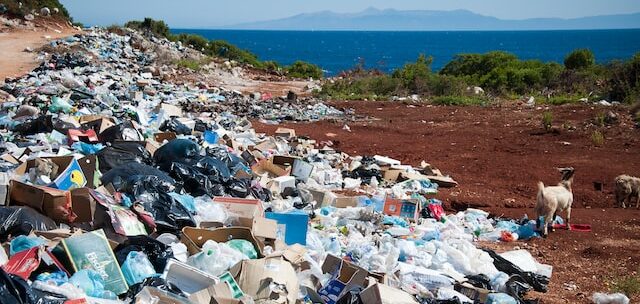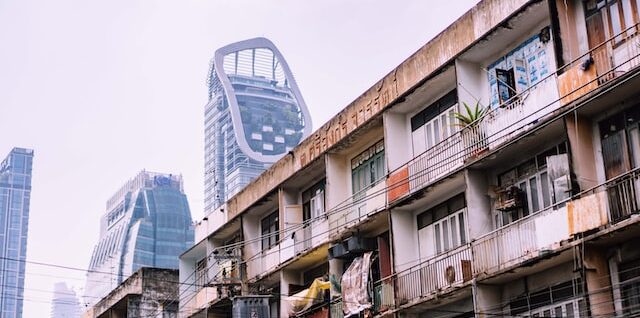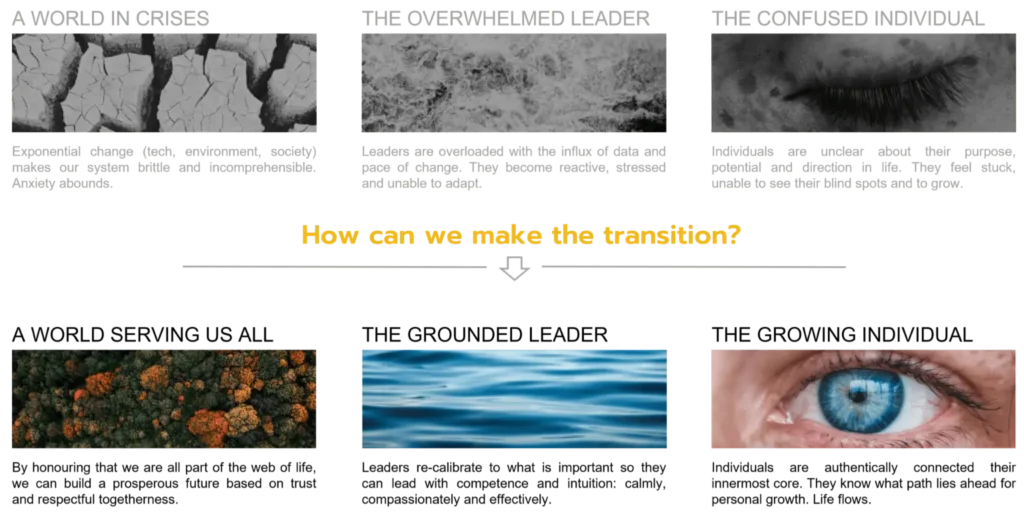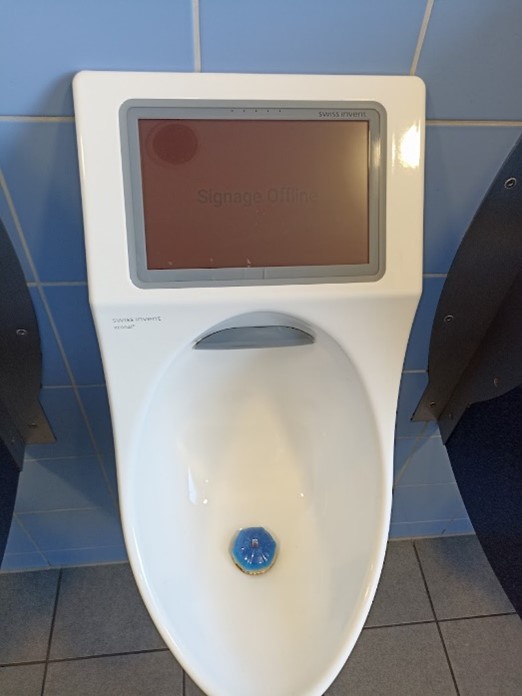Dmitrij Achelrod PhD
Contributing Author
Christopher Kabakis
Dmitrij Achelrod PhD
Contributing Author
Christopher Kabakis
What does “deep inner work” actually mean?
In the many conversations with leaders and change-makers from diverse sectors (business, non-profit, NGO, government) from all over the world over the past year, people continuously asked us one fundamental question: “What does ‘deep inner work’ really mean”? Numerous schools of thought, ranging from millennia-old philosophies to modern academic approaches like developmental psychology and evolutionary biology, have made invaluable contributions over time to the understanding and fostering of human growth and development. At Evolute Institute, we tried to synthesize the best insights from these wisdom traditions, scientific theories and practices as well as from applied therapeutic process work and coaching. Our motivation was to create a framework for “deep inner work” that can stand the test of time and advance human well-being and flourishing – both in our personal as well as professional lives, because the need for it has never been more urgent than now.
Why is deep inner work necessary at all?
At a global level, we are entering an era of unpredictability and brittleness where established organizational principles of society and economy from the past are no longer sufficient or helpful. The signs of massive systemic disbalance can no longer be ignored even by the brightest optimists. To name just a few examples:
Aggravating state of global mental health
Despite advancements in technology and in material living standards of most people in the last 4 decades, we are facing unprecedented mental health challenges. Depression and anxiety have become one of the leading causes of worldwide disability, suicide is the fourth leading cause of death among teens and young adults.[1][2] Both rates have been climbing over the past decades, in particular in the USA where suicide rates are the highest recorded since the 1990s[3]. Two-thirds of young people report serious loneliness[4], and this trend has been rampant even before the onset of the Covid pandemic.[5]

Environmental collapse
We are on the brink of the Sixth Mass Extinction – the first one caused by human activity – with more than 25 percent (i.e. 1 million species) of plant, animal and fungi species facing extinction. The global biomass of wild mammals has declined by 82 percent and three quarter of the earth’s land surface has been already severely altered[6]. Exploitation of natural resources has reached record highs: for instance, only between 2000 and 2014, the world’s second largest rainforest in the Congo Basin has lost an area of pristine forest larger than Bangladesh.[7] Worldwide, we destroy a football pitch-sized area of tropical rainforest every six seconds.[8] In addition to this catastrophic biodiversity loss, we are heading towards 2-3 C° of global warming[9], with devastating non-linear and irreversible chain-reactions likely to follow.[10] Even now, we are already feeling the repercussions of the highest atmospheric CO2 concentrations recorded in human history[11], with the seven hottest years in the past 140 years having all occurred since 2014. [12]

Rising inequality
Since 1995, the top 1% have accumulated almost 20 times more of global wealth than the bottom 50 percent of humanity. U.S. CEOs in 1965 made 24 times more than the average production worker, whereas in 2009 they made 185 times more.[13] In 2022, the average gap between CEO and median worker propelled to 670-to-1.[14] In most Western countries, like in Germany, social mobility has declined in the past three decades [15] and a person’s attainable social status is still heavily determined by the occupational status of their great-grandparents.[16] Even our lifestyle leaves vastly unequal ecological footprints on the planet, with the twenty richest billionaires emitting, on average, 8000 times more CO2 than the billion poorest people.[17] In view of these developments, it is no surprise that people’s trust in their (political, business and media) leadership has hit record lows across the globe.[18][19][20]


But… technology will save us, right?
Some of us might contest that what we need is simply more sophisticated technology to deal with the most pressing issues of our time. For example, if we only found a better way to store carbon dioxide or produce cleaner energy, then the dilemma of climate change would resolve, and we could continue driving economic growth. However, both empirical research[21], the careful observation of historical developments and even ancient wisdom tell a different story: technology developed and applied with our current mindset will only create new problems of the same kind, which in turn will have to be solved by yet more advanced technology. As long as we do not address the “growth-constrained” and extractive zeitgeist of late-stage capitalism and its alienation from the ecological, social and psychological reality, we will only perpetuate our plight.
To illustrate our point (with a pinch of salt), let’s have a look together at the following discovery we have recently made during one of our work trips through Germany:

Yes, it is a beautiful, egg-shaped ceramic pissoir located inside a fuel station along a West-German highway. The astonishing detail though is not the elegant shape of this urinal, but the massive LED-screen located on top of it. That’s right: we use high-resolution LED-screens and valuable resources to mount a display on top of a pissoir, so that we can be bombarded with commercials to buy products we do not need with money we do not have whilst we are emptying our bladders. An achievement the human civilization has been desperately waiting for, tech is our savior! Admittedly, this example is somewhat simplified and exaggerated, but is still raises a valid point: tech alone without the appropriate mindset designing it is very unlikely to make our lives better. Indeed, the list of innovations that once were considered game-changers and silver-bullets for humanity but post-hoc turned out to be existential threats to (a healthy) life on this planet is long: nuclear fission, plastics, artificial fertilizers, DDT, chlorofluorocarbons, combustion engines, rapid production cycles in fast-fashion etc.
As the saying goes, we cannot solve a problem with the same mindset that created it. Jack Kornfield (PhD), a renowned Western teacher of Buddhism, put it very clearly:
“No amount of new technology…will stop continuing warfare and racism and environmental destruction. This is a pivotal point in our history. The powers of science and technology now have to be matched by the inner developments of humanity”.
Jack Kornfield, PhD
Inner development for outer transformation
It follows, then, that external technological innovations need to be accompanied by an internal development of our mindsets (to be clear: yes, innovation is important and we urgently require more green tech!). In particular, we need to start questioning fundamental and sometimes barely visible assumptions of our (Western) culture. We need to shed light on the implicit operating mechanisms that hide in our collective shadow and that fundamentally determine our worldview and values:
- What is our relationship to our planet (extractive vs. nourishing)?
- What values are socially desirable (wealth & power vs. compassion & responsibility)?
- What socio-political narratives do we want to tell (economic growth vs. well-being of all life forms)?
But inner development does not stop on a societal level. Even more so, the path of inner transformation requires us to face hard questions on a deeply personal level:
- Do I know what is truly important to me in life?
- Do I have the capacity to act with clarity and courage in those increasingly complex times?
- How do I deal with my personal feelings of despair, anxiety, and fear?
- What is separating me from myself and from other?
- Am I able to recognize and embrace my own shadows?
- From what inner space can I be a role-model and inspiration to others?
Inner transformation on an individual level is a requirement for transformation on the systems level. Mahatma Gandhi said that “we but mirror the world. All the tendencies present in the outer world are to be found in the world of our body. If we could change ourselves, the tendencies in the world would also change.”
When everything around us is collapsing and changing at a dizzying pace, we need to ground us within ourselves and within new types of community and relating in order to find stability, calm, resilience, and orientation. Being able to connect to our deepest core allows us to tap into our sources of strength and inspiration so that we can lead ourselves and others from a compass within.
In the face of imminent environmental collapse, potential nuclear war, skyrocketing economic inequality, and aggravating socio-political radicalization, our capacity to truthfully relate to our own selves AND to the world around us will determine the quality of our personal and collective well-being in the future more than anything else. Recognizing, embracing, and overcoming our own wounding and shadows opens within us the necessary space to cultivate the seeds of growth: insight, competence, vision, creativity, responsibility, purpose, connection, and inner freedom. Liberating ourselves from our distorted, calcified, self-limiting (and sometimes self-aggrandizing) beliefs is the single most effective way of unlocking our full creative powers and catalysing personal transformation – be it on a personal or on a professional level.
The path towards that transformation is what we call “deep inner work”.
“What can we gain by sailing to the moon if we are not able to cross the abyss that separates us from ourselves? This is the most important of all voyages of discovery, and without it, all the rest are not only useless, but disastrous.”.
Thomas Merton
Eight key perspectives on inner work at the Evolute Institute
So we must assume the path of inner development if we want to see positive change in ourselves and in the world. Thus, in this weekly series of articles, we would like to start exploring with you eight complementary perspectives on the inner work that we foster and promote at Evolute Institute. These eight perspectives are:
- Increasing our inner freedom
- Moving into higher mindsets
- From disconnection to re-connection & addressing trauma
- Healing Psychological Wounding and the Work of Grief
- Overcoming Cultural Conditioning
- Increasing Psychological Flexibility
- Fostering Integration through and beyond psychedelic work
- Acquiring Wisdom for a Good Life
[1] WHO 2022 https://www.who.int/teams/mental-health-and-substance-use/world-mental-health-report
[2] https://www.thelancet.com/journals/lancet/article/PIIS0140-6736(21)02143-7/fulltext
[3] https://www.commonwealthfund.org/press-release/2020/new-international-report-health-care-us-suicide-rate-highest-among-wealthy
[4] https://www.gse.harvard.edu/news/21/02/combatting-epidemic-loneliness
[5] https://www.cdc.gov/mmwr/volumes/71/su/su7102a1.htm
[6] Intergovernmental Science-Policy Platform on Biodiversity and Ecosystem Services https://zenodo.org/record/3553579.
[7] https://www.science.org/doi/10.1126/sciadv.aat2993
[8] https://www.theguardian.com/environment/2020/jun/02/football-pitch-area-tropical-rainforest-lost-every-six-seconds
[9] https://www.theguardian.com/environment/2022/sep/08/world-on-brink-five-climate-tipping-points-study-finds
[10] https://www.science.org/doi/10.1126/science.abn7950
[11] https://doi.org/10.1126/sciadv.aav7337
[12] https://www.noaa.gov/news/2020-was-earth-s-2nd-hottest-year-just-behind-2016.
[13] https://inequality.stanford.edu/publications/20-facts-about-us-inequality-everyone-should-know
[14] https://www.theguardian.com/us-news/2022/jun/07/us-wage-gap-ceos-workers-institute-for-policy-studies-report#:~:text=A%20study%20of%20300%20top,%2Dto%2D1%20in%202020.
[15] https://www.oecd-ilibrary.org/sites/03b3c8b6-en/index.html?itemId=/content/component/03b3c8b6-en
[16] Sebastian Braun, Jan Stuhler: The Transmission of Inequality Across Multiple Generations: Testing Recent Theories with Evidence from Germany, in: The Economic Journal 128 (March) 2018, 576-611.
[17] https://www.oxfam.org/en/5-shocking-facts-about-extreme-global-inequality-and-how-even-it
[18] https://www.pewresearch.org/politics/2022/06/06/public-trust-in-government-1958-2022/
[19] https://www.ippr.org/news-and-media/press-releases/revealed-trust-in-politicians-at-lowest-level-on-record/
[20] https://www.axios.com/2022/01/18/distrust-in-political-media-and-business-leaders-sweeps-the-globe
[21] Jason Hickel & Giorgos Kallis (2020) Is Green Growth Possible?, New Political Economy, 25:4, 469-486, DOI: 10.1080/13563467.2019.1598964
Images
Photo by Tyler Lastovich on Unsplash
Photo by Nick van den Berg on Unsplash
Photo by Earl Wilcox on Unsplash
Photo by Michael Jasmund on Unsplash
Photo by Ashley Groom on Unsplash
Photo by Hikersbay Hikersbay on Unsplash



